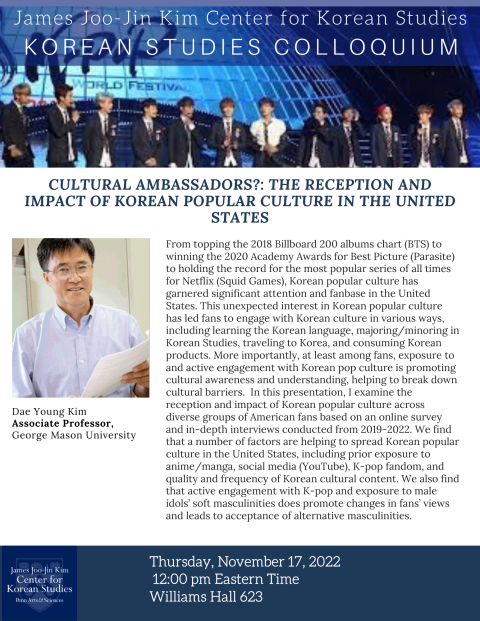
Korean Studies Colloquium
Williams Hall 623
From topping the 2018 Billboard 200 albums chart (BTS) to winning the 2020 Academy Awards for Best Picture (Parasite) to holding the record for the most popular series of all times for Netflix (Squid Games), Korean popular culture has garnered significant attention and fanbase in the United States. This unexpected interest in Korean popular culture has led fans to engage with Korean culture in various ways, including learning the Korean language, majoring/minoring in Korean Studies, traveling to Korea, and consuming Korean products. More importantly, at least among fans, exposure to and active engagement with Korean pop culture is promoting cultural awareness and understanding, helping to break down cultural barriers. In this presentation, I examine the reception and impact of Korean popular culture across diverse groups of American fans based on an online survey and in-depth interviews conducted from 2019-2022. We find that a number of factors are helping to spread Korean popular culture in the United States, including prior exposure to anime/manga, social media (YouTube), K-pop fandom, and quality and frequency of Korean cultural content. We also find that active engagement with K-pop and exposure to male idols’ soft masculinities does promote changes in fans’ views and leads to acceptance of alternative masculinities.
Dr. Dae Young Kim received his B.A. in Sociology and Spanish from SUNY-Binghamton and his Ph.D. in Sociology from CUNY Graduate Center. He is associate professor of Sociology in the Department of Sociology and Anthropology at George Mason University. His research on the integration of first, 1.5, and second-generation Korean Americans has appeared in Ethnic and Racial Studies, International Migration Review, Sociology of Religion, and Sociological Forum. He is also the author of Second-Generation Korean Americans: Their Struggle for Full Inclusion and Transnational Communities in the Smartphone Age: The Korean Community in the Nation’s Capital. Dr. Kim is currently conducting research on the growing popularity of K-pop, K-dramas/variety shows, and K-films in the United States, especially their reception and impact across diverse racial and ethnic groups.
 James Joo-Jin Kim Center for Korean Studies
James Joo-Jin Kim Center for Korean Studies